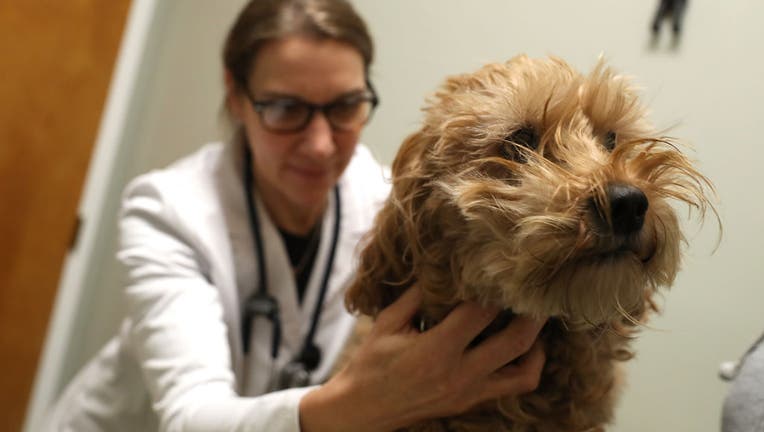Dog flu outbreaks hit shelters, homes across US as vets encourage owners to get their dog vaccinated

Veternarian Dr. Linda Pirie examines a dog named Louie at Los Gatos Dog and Cat Hospital in Los Gatos, California. (Photo by Justin Sullivan/Getty Images)
Humans are not the only ones suffering from this winter's extreme flu season, with veterinarians across the U.S. advising dog owners to vaccinate their furry friends.
"Canine flu is one of the infectious respiratory things that we can see in dogs," Dr. Jess Fejes, medical director at the Veterinary Emergency Group, told Fox 29.
Canine flu symptoms include coughing, sneezing, eye, and nose discharge, fever, lethargy, and trouble breathing. While there are limited treatment options after a dog becomes infected, there is a preventative vaccine. While it is not a core puppy vaccine, dogs at risk of catching the flu virus can receive it from their vet.
DogFlu.com shows a map of dog influenza outbreaks across the U.S., including recent outbreaks in nine states, including New York, Texas, Florida, South Carolina, and Pennsylvania.
Vets are now having the flu shot discussion with dog owners. They say not every dog needs the vaccine, but if a dog is social, it’s something an owner should consider.
"It’s going to be somewhat specific, based on region and what they are exposed to, but, generally, dogs exposed to a lot of other dogs, dogs in doggie daycare, boarding, things like that," Dr. Fejes explained.
If pet owners choose to keep their dogs unvaccinated, there are still ways to ensure that your pooch stays safe this flu season. The viruses spread through the air, so places where dogs congregate, like dog parks, can be risky for man's best friend.

Vials of canine influenza vaccine sit on a table at Los Gatos Dog and Cat Hospital in Los Gatos, California. (Photo by Justin Sullivan/Getty Images)
"Canine influenza is transmitted through droplets or aerosols containing respiratory secretions from coughing, barking and sneezing. Dogs in close contact with infected dogs in places such as kennels, groomers, daycare facilities, and shelters are at increased risk of infection." the American Veterinary Medical Association explained. "Canine influenza can be spread indirectly through objects (e.g., kennels, food and water bowls, collars and leashes) or people that have been in contact with infected dogs."
According to one veterinary office in Florida, an influenza vaccine will only cost between $25 and $35.
Dog owners should always be on the lookout for warning signs. If your dog stops eating or has difficulty breathing, contact your veterinarian. The American Veterinary Medical Association advised that getting your dog vaccinated for canine influenza may not prevent infection altogether, but it may reduce the severity and duration of the illness.

